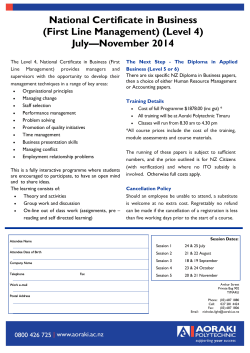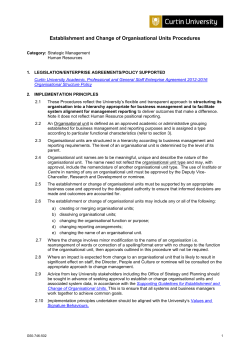
Haifa University 16th COHRM Crisis Management 29 April, 2015
Organisational Crisis; Antecedents, Challenges, Solutions Prof. Zachary Sheaffer Dept. of Economics & Business Administration Ariel University th 16 Haifa University COHRM Crisis Management 29 April, 2015 The English word “crisis” is 危机 in Chinese. It has two Chinese characters: 危 means danger, threats and 机 implies opportunities. 23 Sept. 2008 NYC Stock Exchange Vietnam 1966 ECONOMIC WAR Twin Towers 20 11 2001 TERROR Tsunami Fukushima 11 March 2011 NATURAL DISASTERS An organisational crisis is a high impact event that threatens the viability of the organisation and is typified by vagueness of cause, effect and means of resolution, as well as by a belief that decisions must be made swiftly. Organisational crisis is a multidimensional event encompassing all organisational components in a vicious circle, is perceived by stakeholders as threatening organisational viability & experienced by them as threatening both personally & socially. The ambiguity accompanying the cause, influence & solution results in disillusions or inability to interpret the situation. It shatters common beliefs, values & basic personal assumptions. Decision-making process is affected by strict time constraints and is exacerbated by cognitive limitations. Bankruptcy Date: 09/15/2008• Assets: $691 billion• 09/26/2008• Washington Mutual Assets: $327.9 billion• 07/21/2002• Assets: $103.9 billion• 12/17/2002• Assets: $61 billion• 06/01/2009• Assets: $91 billion• 11/01/2009• Assets: $71 billion• 04/30/2009• Assets: $39 billion• 12/02/2001 Assets $ :65.5 billion Israel’s national budget (2013-14) 101 Billion US$ The Event Approach: A crisis as an adverse event. Typically, the 1982 Tylenol poisoning (Heath & Palenchar, 2009) and the 1986 Chernobyl disaster (Falkheimer & Heide, 2006) Logical conceptualisation of CM as a chiefly tactical activity focussed on incident response (what to do when a crisis occurs and how to prepare for it in case it happens Functional activities critically important for successful organisational crisis response and recovery “A crisis is a sudden and unexpected event that threatens to disrupt an organisation’s operations and poses both a financial and reputations threat” (Coombs, 2007) “A crisis is an unplanned (but not necessarily unexpected) event that calls for real-time high level strategic decisions in circumstances where making the wrong decisions, or not responding quickly or proactively enough, could seriously harm the organisation” (Davies, 2005) The event approach typically positions CM structurally alongside operational or technical functions (security or emergency response, public affairs: media or community relations). The Process Approach Recent developments views CM as an evolution beyond operationalised response Essentially, a growing awareness that proactive managers can and should be prepared to avoid a crisis happening, 1st and foremost Increasing acceptance of CM as part of a process continuum, which builds on the recognition that: (a)most crises are not sudden events but follow a Root Causes CRISIS SYSTEMS SYSTEMS 1. Technology 3. Human Factors 1 2 3 2. Org Structure/Strategy 4 5 4. Culture 5. TMT Psyche
© Copyright 2025


















